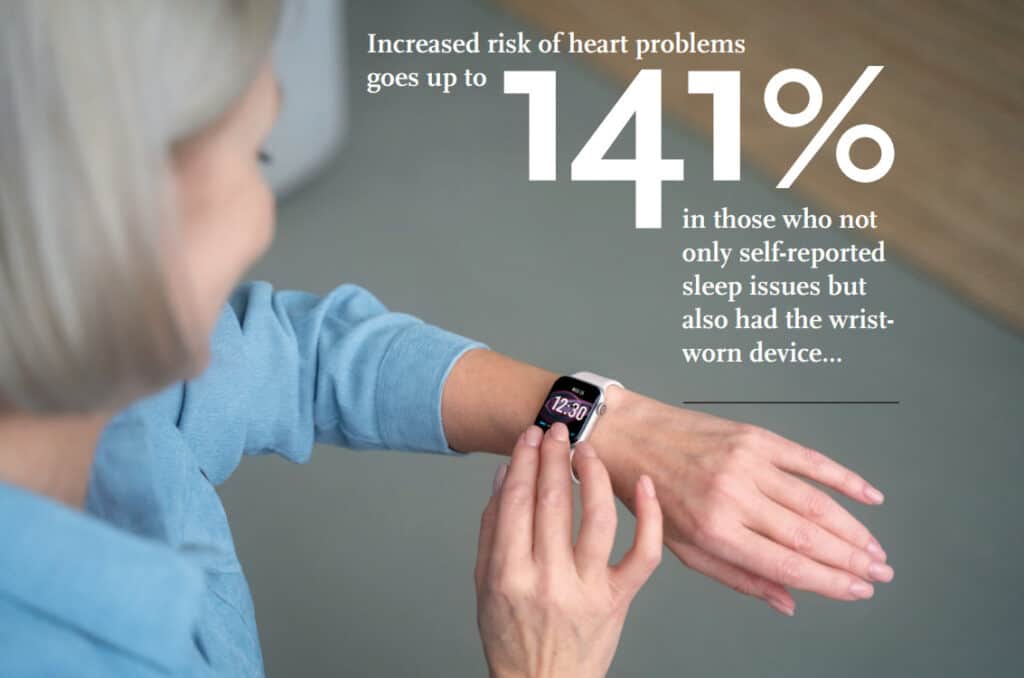Dr. Lee A. Surkin discusses the links between, sleep and heart health and the body’s ability to restore and recharge.
 by Lee A. Surkin, MD, FACC, FCCP, FASNC, FAASM
by Lee A. Surkin, MD, FACC, FCCP, FASNC, FAASM
The heart is the key element of the circulatory system which makes sure that all the organs and tissues get the oxygen needed. So, being responsible for pumping blood throughout the body, we should never underestimate the importance of heart health.
We are already aware that factors like smoking, poor diet, and lack of physical exercise may lead to heart problems. But, did you know that sleep and heart health are also closely connected? Namely, poor sleep can also negatively affect the heart as sleep allows the body to restore and recharge.
A recent study found that the risk of heart disease may nearly triple for those who have a mix of sleep issues…1
Sleep deprivation can indeed contribute to many heart problems including high blood pressure or an increased risk of heart failure, heart attack, arrhythmias, diabetes, and stroke. Logically, we can conclude that addressing poor sleep may help heart health and help prevent damage to the entire cardiovascular system.
So, given the strong link between sleep and heart health and the importance of both for optimal physical health, researchers have done an extensive study on the topic. To find out more, continue reading below.
The Study – Basics
A recent study found that the risk of heart disease may nearly triple for those who have a mix of sleep issues like trouble falling asleep, waking up way too early, or not getting the recommended amount of sleep each night.1 So, the evidence once again highlights the connection between sleep and heart health.
To be more precise, the study was conducted on 7,483 American adults in midlife who provided detailed information about their sleep and heart health, everything from their sleep habits to their heart disease history. In addition, 663 participants were given a wrist-worn device to record their sleep activity.
Furthermore, a little bit more than half of the participants were women, three-quarters were white and 16% were black. Their average age was 53. And, if you were asking yourself why the study included only middle-aged people, the reason is that adults, in that period, typically go through diverse and stressful experiences, age-related sleep problems and early signs of heart disease appear.
How was Sleep Assessed in the Study?
To find out how sleep affects heart health, researchers conducting the study focused on several aspects of sleep, including:
- Sleep regularity – whether participants followed a consistent sleep schedule, i.e. went to bed and woke up at the same time during workdays and at weekends.
- Sleep satisfaction – whether participants faced issues falling asleep and staying asleep throughout the entire night, and if they woke up, were they able to go back to sleep easily.
- Alertness – whether they felt sleepy and tired during the day, and how often they had naps longer than five
- Sleep latency – how long it took participants to fall asleep after getting in bed.
- Sleep duration – how long they slept each night.

What’s more, to be able to identify the connection between sleep and heart health, participants were also asked questions about their heart disease history, whether they had suspected they had heart problems at any time in their life, and whether they sometimes experienced chest pain longer than 30 minutes.
The Findings
The study found that each increase in self-reported poor sleep was linked to a 54% increased risk of heart problems compared to those with normal sleep schedules. Still, this increase in risk goes up to 141% in those who not only self-reported sleep issues but also had the wrist-worn device which is considered to be more accurate.
Therefore, if you are experiencing poor sleep, ensure you consult your doctor about how you can improve your sleep so as not to affect your heart health because sleep and heart health are closely connected.
Drs. Alan Steljes and Lee Surkin have written about the connections between better sleep and heart health in their article, “A Much Needed Paradigm Shift to Cardio-Sleep.” Read about it here. https://dentalsleeppractice.com/a-much-needed-paradigm-shift-to-cardio-sleep/
- Lee, S. Mu, Cristina, et al. (Feb 7, 2022). Sleep health composites are associated with the risk of heart disease across sex and race. PubMed. https://pubmed.ncbi.nlm.nih.gov/35132087/
 Lee A. Surkin, MD, is the Chief Medical Officer of Nexus Dental Systems. A private practitioner in cardiology, sleep medicine, and obesity medicine, he is one of a small group of physicians to be triple board certified in cardiology, sleep medicine, and nuclear cardiology. In 2009, he created Carolina Sleep – the only dedicated sleep medicine practice in eastern NC. Dr. Surkin has created a cardiovascular and sleep healthcare model that includes a multi-faceted diagnostic and treatment approach that is enhanced by a network of relationships with physicians, dentists, respiratory therapists, sleep technologists, and public officials who recognize the important role that sleep medicine has in our daily life. In 2012, Dr. Surkin founded the American Academy of Cardiovascular Sleep Medicine which is a not-for-profit academic organization dedicated to educating healthcare providers, supporting research, and increasing public awareness of the convergence between cardiovascular disease and sleep disorders. In 2014, Dr. Surkin created a new multi-specialty practice called Carolina Clinic for Health and Wellness which combines his specialties with primary care, gynecology, behavioral health and a medical spa. Dr. Surkin is married with three daughters and a golden retriever and resides in Greenville, NC.
Lee A. Surkin, MD, is the Chief Medical Officer of Nexus Dental Systems. A private practitioner in cardiology, sleep medicine, and obesity medicine, he is one of a small group of physicians to be triple board certified in cardiology, sleep medicine, and nuclear cardiology. In 2009, he created Carolina Sleep – the only dedicated sleep medicine practice in eastern NC. Dr. Surkin has created a cardiovascular and sleep healthcare model that includes a multi-faceted diagnostic and treatment approach that is enhanced by a network of relationships with physicians, dentists, respiratory therapists, sleep technologists, and public officials who recognize the important role that sleep medicine has in our daily life. In 2012, Dr. Surkin founded the American Academy of Cardiovascular Sleep Medicine which is a not-for-profit academic organization dedicated to educating healthcare providers, supporting research, and increasing public awareness of the convergence between cardiovascular disease and sleep disorders. In 2014, Dr. Surkin created a new multi-specialty practice called Carolina Clinic for Health and Wellness which combines his specialties with primary care, gynecology, behavioral health and a medical spa. Dr. Surkin is married with three daughters and a golden retriever and resides in Greenville, NC.